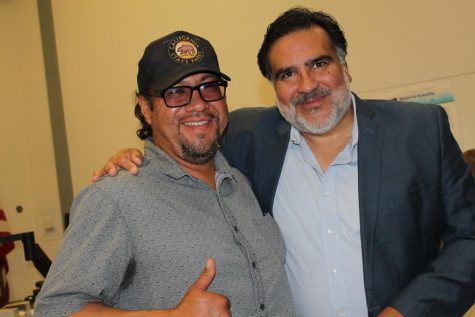BC presents the life of Chicano activist Oscar Zeta Acosta
April 26, 2019

Jesse Calderon (left) who portrays Oscar Zeta Acosta in “The Rise and Fall of the Brown Buffalo” with producer Philip Rodriguez (right).
The documentary “The Rise and Fall of the Brown Buffalo” played for BC students in Forum 101 on the BC campus April 24.
This documentary was presented to others the life of Oscar Zeta Acosta.
Acosta was an attorney who played an important role in the Chicano movement.
Born in El Paso, TX in1935, Acosta moved with his family when he was a small boy to Riverbank, California, a small town in the San Joaquin Valley near Modesto.
During his senior year of high school Acosta dated one of the most popular girls in school, who happened to be a white girl. This was during a time in America when inter-racial dating was frowned upon. His girlfriend’s parents called the police on Acosta and he was given two options, go to jail or join the military.
After graduating from high school at the age of seventeen, Acosta joined the United States Air Force. It was during this time Acosta became a preacher.
“I became the Mexican Billy Graham.” Acosta would later share during an interview.
Once Acosta completed his service to the US Air force he returned to California and attended a Junior College. He eventually put himself through law school and practiced law in Oakland, Ca.
In 1968 Acosta moved to east Los Angles and joined the Chicano Movement as an activist attorney. He would go on to defend the Chicano 13, a group of high school students who orchestrated a walkout in protest of unequal conditions within the school district.
It got to a point where Acosta would only accept cases of Chicano clients.
Eventually Acosta became heavily involved in drugs and alcohol and no longer wanted to be a Preacher. He wrote a resignation letter to Jesus in which he asked, “how did I get so carried away? I didn’t come to save anyone, I came to save myself.”
Acosta had become well known throughout the Chicano community as well within the Los Angeles Police Department.
Jorge Rodriguez, a former friend and room-mate of Acosta told of a story when Acosta set the front lawn of a Judge on fire.
According to Rodriguez this was Acosta’s way of combating the cross burning of the Klu Klux Klan. Acosta was never arrested for setting the fire.
In 1970, Acosta ran for Sherriff of the LAPD. It was later said that he knew he didn’t have a “snowball chance in hell of winning.” He was defeated by several thousands of votes.
This documentary show cased a lot of information of what Acosta did for the Chicano Movement.
Acosta had a nervous breakdown and left for a trip to Mexico when he disappeared.
For years many people have speculated as to what happened to Acosta.
Once the documentary ended, time was allowed for a Q&A period.
One audience member asked Phillip Rodriguez, the producer of the documentary, how long did it take to make the film?
“This project had been in the works for many years, at least 20” said Rodriguez. Once he graduated college, he tried to get the rights for the documentary but was initially denied. Years later he tried again and was successful.
Jesses Calderon, the actor who portrayed Oscar Zeta Acosta said he enjoyed playing this role. “I went to a lot of the different restaurants that Oscar was known to frequent.”
Calderon’s mother was also in attendance to view the documentary. When asked how many times she had viewed the documentary thus far, she said, “oh it has been about 10 times at least.”






